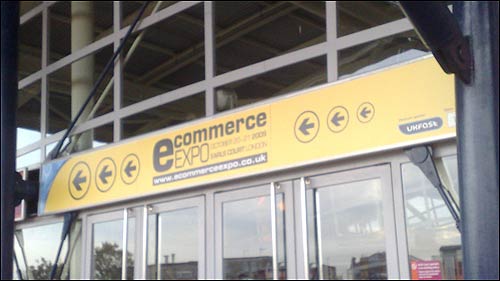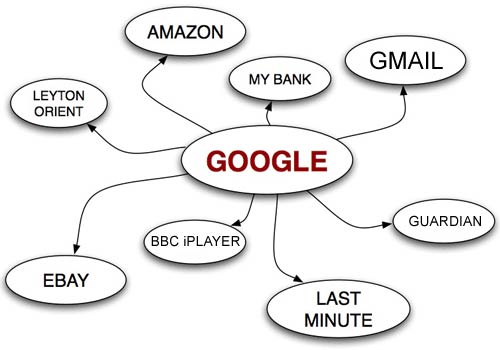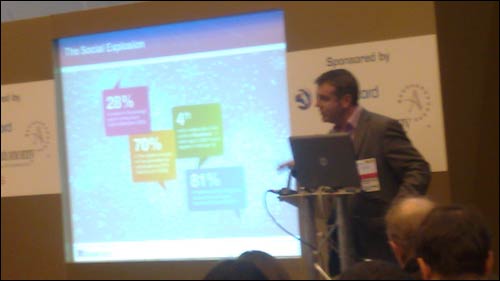Ecommerce Expo: Part 3 - "Social commerce prioritisation: Where should we start?"
I've been posting a series of the notes and quotes I made at the London Ecommerce Expo in Earls Court. So far I've featured a case study in multi-variant testing from British Airways, and a presentation by Trenton Moss of Webcredible about optimising the purchase process. Today I wanted to turn my attention to 'social commerce'.

"Social commerce prioritisation: Where should we start?" - Andy Leaver, Bazaarvoice
Andy Leaver of Bazaarvoice opened by making a point that Google may turn out to be a generational thing. For many years most of us have worked on the premise that the centre of the people's Internet universe is a search engine - and that usually that search engine is Google.

He suggested that increasingly younger people start their Internet journey not on Google (or Bing or Ask or Yahoo!), but on a social site like Facebook, which has become 'the hub' in the centre of their Internet experience. People are now looking for real-time confirmation of information and trends, rather than the static Internet search we have been used to.

Bazaarvoice work with a wide range of companies, integrating and curating user-generated content into their marketing process - indeed, as Andy observed "social networks seem like a marketer's dream". He had some great examples of companies integrating their digital social content into the real world. Best Buy in the States, for example, use their highest rated products online as the basis for what goes into their newspaper advertising inserts.
Another company - whose name escaped my notes, I think it was Urban Outfitters - really worked with the people making up their online 'community'. They figured that as 80% of the reviews and content on the site was coming from 20% of users, if they really got to know those users they'd have better customer insight. In the end they got in touch with the most active community members and profiled them, using those profiles in marketing material. This helped promote the idea that the reviews are coming from 'people like me', which seems one of the keys to success in social commerce. With film reviews, for example, it is no good to me if a load of 15 year olds rate a film as really good or totally boring, what I need to know is whether people my age, with my taste and interests recommend it.
Andy also touched on what people are calling 'omni-channel' marketing. Instead of shopping in one way or another, customers utilise lots of different ways to shop. He quoted John Lewis as saying that 51% of people who make a purchase in-store have already researched the product they want to buy online. He thinks the days where people will habitually scan barcodes themselves in shops on devices like the iPhone is not far off. He has sometimes experienced a negative reaction from sakes staff when using his Blackberry to research products in store, but his argument is that all he is doing is finding information 'from your customers'.
Some other interesting numbers he mentioned including a prediction that 70% of content generated on the web will have been made by individuals rather than enterprises, and the fact that Argos get 30,000 online reviews left on their site every week, sometimes peaking to as much as 70,000 reviews in one day.
Language and labels are key
A common theme that emerged from the three sessions I attended on day one of the Ecommerce Expo was the use of language. In his talk, Mike Tomlinson from BA had identified small text changes as one of their key ways of optimising their site. He said that the air industry used lots of specialist jargon, and converting that complex language into something customers understood more easily drove sales.
Trenton from Webcredible also talked about how crucial it was to get labels right. He used the John Lewis checkout process as an example of where language is used to allay user fears. He also stressed the precision needed in giving users instructions - he'd seen someone in a usability lab type "yes" as their response to the input field: 'Confirm email address'.
For Bazaarvoice, the value of using the customer's own voice to describe was also a question related to language. A retailer might describe a product using brand and model number, but it is user reviews where it might be referred to as a phone, telephone, mobile and handset. This gave SEO long-tail benefits, and helped to reinforce that a site was serving a customer base of 'people like me'.
Next...
Over the next few days I'll have some shorter round-ups of some of the other sessions that I attended across the course of the two Ecommerce Expo days.